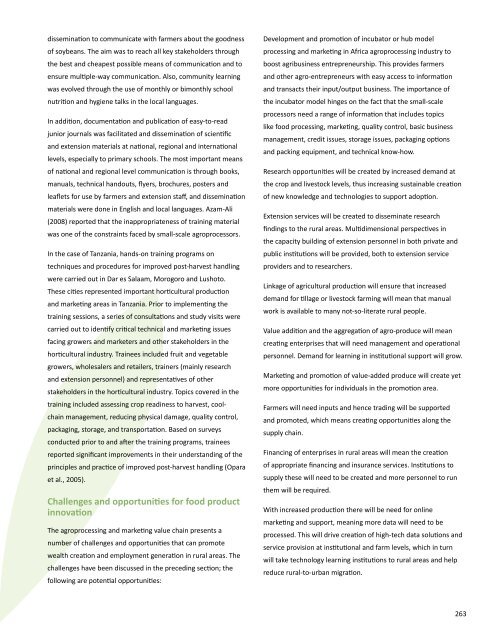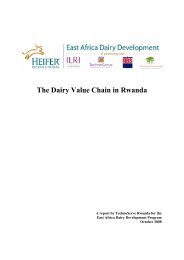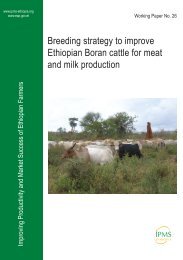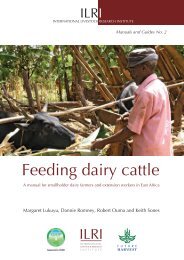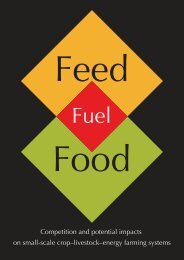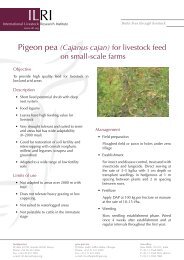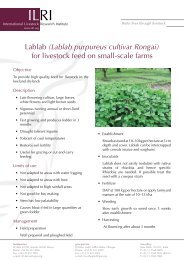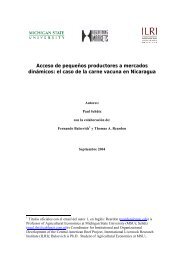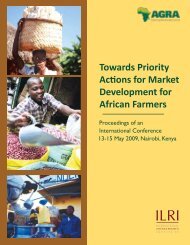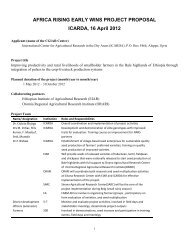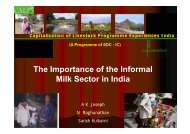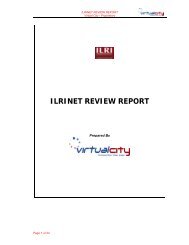High-Value Commodities and Agroprocessing - International ...
High-Value Commodities and Agroprocessing - International ...
High-Value Commodities and Agroprocessing - International ...
Create successful ePaper yourself
Turn your PDF publications into a flip-book with our unique Google optimized e-Paper software.
dissemination to communicate with farmers about the goodness<br />
of soybeans. The aim was to reach all key stakeholders through<br />
the best <strong>and</strong> cheapest possible means of communication <strong>and</strong> to<br />
ensure multiple-way communication. Also, community learning<br />
was evolved through the use of monthly or bimonthly school<br />
nutrition <strong>and</strong> hygiene talks in the local languages.<br />
In addition, documentation <strong>and</strong> publication of easy-to-read<br />
junior journals was facilitated <strong>and</strong> dissemination of scientific<br />
<strong>and</strong> extension materials at national, regional <strong>and</strong> international<br />
levels, especially to primary schools. The most important means<br />
of national <strong>and</strong> regional level communication is through books,<br />
manuals, technical h<strong>and</strong>outs, flyers, brochures, posters <strong>and</strong><br />
leaflets for use by farmers <strong>and</strong> extension staff, <strong>and</strong> dissemination<br />
materials were done in English <strong>and</strong> local languages. Azam-Ali<br />
(2008) reported that the inappropriateness of training material<br />
was one of the constraints faced by small-scale agroprocessors.<br />
In the case of Tanzania, h<strong>and</strong>s-on training programs on<br />
techniques <strong>and</strong> procedures for improved post-harvest h<strong>and</strong>ling<br />
were carried out in Dar es Salaam, Morogoro <strong>and</strong> Lushoto.<br />
These cities represented important horticultural production<br />
<strong>and</strong> marketing areas in Tanzania. Prior to implementing the<br />
training sessions, a series of consultations <strong>and</strong> study visits were<br />
carried out to identify critical technical <strong>and</strong> marketing issues<br />
facing growers <strong>and</strong> marketers <strong>and</strong> other stakeholders in the<br />
horticultural industry. Trainees included fruit <strong>and</strong> vegetable<br />
growers, wholesalers <strong>and</strong> retailers, trainers (mainly research<br />
<strong>and</strong> extension personnel) <strong>and</strong> representatives of other<br />
stakeholders in the horticultural industry. Topics covered in the<br />
training included assessing crop readiness to harvest, coolchain<br />
management, reducing physical damage, quality control,<br />
packaging, storage, <strong>and</strong> transportation. Based on surveys<br />
conducted prior to <strong>and</strong> after the training programs, trainees<br />
reported significant improvements in their underst<strong>and</strong>ing of the<br />
principles <strong>and</strong> practice of improved post-harvest h<strong>and</strong>ling (Opara<br />
et al., 2005).<br />
Challenges <strong>and</strong> opportunities for food product<br />
innovation<br />
The agroprocessing <strong>and</strong> marketing value chain presents a<br />
number of challenges <strong>and</strong> opportunities that can promote<br />
wealth creation <strong>and</strong> employment generation in rural areas. The<br />
challenges have been discussed in the preceding section; the<br />
following are potential opportunities:<br />
Development <strong>and</strong> promotion of incubator or hub model<br />
processing <strong>and</strong> marketing in Africa agroprocessing industry to<br />
boost agribusiness entrepreneurship. This provides farmers<br />
<strong>and</strong> other agro-entrepreneurs with easy access to information<br />
<strong>and</strong> transacts their input/output business. The importance of<br />
the incubator model hinges on the fact that the small-scale<br />
processors need a range of information that includes topics<br />
like food processing, marketing, quality control, basic business<br />
management, credit issues, storage issues, packaging options<br />
<strong>and</strong> packing equipment, <strong>and</strong> technical know-how.<br />
Research opportunities will be created by increased dem<strong>and</strong> at<br />
the crop <strong>and</strong> livestock levels, thus increasing sustainable creation<br />
of new knowledge <strong>and</strong> technologies to support adoption.<br />
Extension services will be created to disseminate research<br />
findings to the rural areas. Multidimensional perspectives in<br />
the capacity building of extension personnel in both private <strong>and</strong><br />
public institutions will be provided, both to extension service<br />
providers <strong>and</strong> to researchers.<br />
Linkage of agricultural production will ensure that increased<br />
dem<strong>and</strong> for tillage or livestock farming will mean that manual<br />
work is available to many not-so-literate rural people.<br />
<strong>Value</strong> addition <strong>and</strong> the aggregation of agro-produce will mean<br />
creating enterprises that will need management <strong>and</strong> operational<br />
personnel. Dem<strong>and</strong> for learning in institutional support will grow.<br />
Marketing <strong>and</strong> promotion of value-added produce will create yet<br />
more opportunities for individuals in the promotion area.<br />
Farmers will need inputs <strong>and</strong> hence trading will be supported<br />
<strong>and</strong> promoted, which means creating opportunities along the<br />
supply chain.<br />
Financing of enterprises in rural areas will mean the creation<br />
of appropriate financing <strong>and</strong> insurance services. Institutions to<br />
supply these will need to be created <strong>and</strong> more personnel to run<br />
them will be required.<br />
With increased production there will be need for online<br />
marketing <strong>and</strong> support, meaning more data will need to be<br />
processed. This will drive creation of high-tech data solutions <strong>and</strong><br />
service provision at institutional <strong>and</strong> farm levels, which in turn<br />
will take technology learning institutions to rural areas <strong>and</strong> help<br />
reduce rural-to-urban migration.<br />
263


